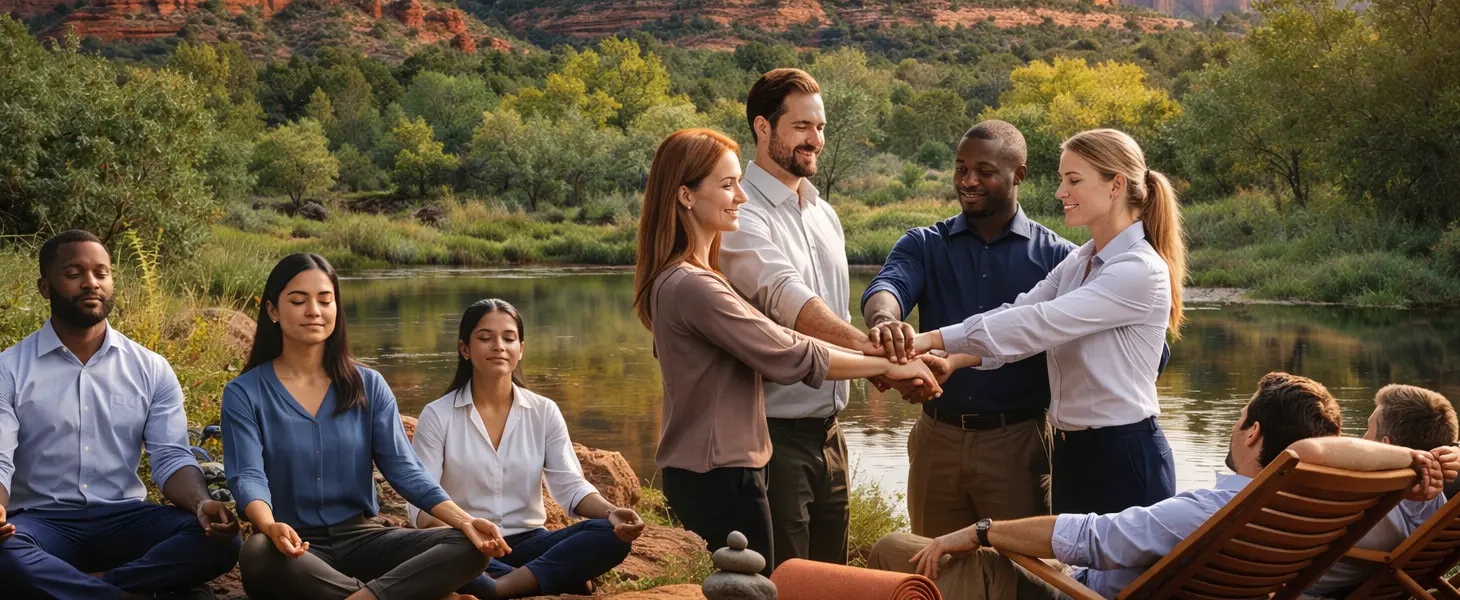What Is a Wellness Coach? How Using Wellness Coaching Can Help You Reach Your Full Potential
You’re feeling “stuck”. You can’t quite put your finger on it, but something about your current life situation just feels off. A friend suggests wellness coaching.
With so many gimmicky-looking ads about bettering yourself, you’re likely wondering if wellness coaching is a legitimate way to improve your overall well-being.
Wellness coaching is only effective if you’re willing to put in the work.
We take a closer look at what to expect from wellness coaches, how it can benefit you, and answer some of your most frequently asked questions.
Table of Contents
- What Does a Wellness Coach Do?
- What Is the Difference Between a Life Coach and a Wellness Coach?
- The 3 Pillars of Wellness Coaching
- FAQs About Wellness Coaching
- Sedona Mago Center for Well-Being and Retreat Provides Wellness Coaching That Allows You To Awaken and Ignite Your Own Healing Powers
What Does a Wellness Coach Do?
A wellness coach is a professional who works with individuals or groups to help them achieve their health and wellness goals. The primary focus of a wellness coach is to support and guide clients in making positive and sustainable changes to improve their overall well-being.
Here are a few common aspects of what a wellness coach does:
- Conducting assessments to understand a client’s current health status, lifestyle, and goals.
- Providing information on nutrition, exercise, stress management, sleep, and other relevant wellness topics.
- Encouraging and motivating clients to stay committed to their wellness goals.
- Establishing regular check-ins to monitor progress and provide accountability.
- Developing personalized wellness plans that take into account the unique needs and preferences of each client.
- Employing behavioral change techniques to help clients overcome obstacles and develop healthier habits.
- Addressing factors such as stress, work-life balance, and relationships that can impact overall wellness.
- Teaching practical skills related to cooking, exercise, and time management.
- Adjusting strategies as needed based on client feedback and results.
The specific focus and approach of a wellness coach may vary depending on their training, philosophy, and the needs of their clients.
What Is the Difference Between a Life Coach and a Wellness Coach?
The primary distinction between a life coach and a wellness coach lies in their respective focuses. A life coach addresses a broad spectrum of personal and professional aspects, helping clients set and achieve goals, navigate life transitions, and enhance overall life satisfaction.
A wellness coach specifically concentrates on health and well-being, guiding clients in areas such as physical, emotional, and spiritual wellness. While life coaching takes a holistic approach to various life domains, wellness coaching has a more specific emphasis on adopting behaviors that contribute to improved physical and mental well-being.
While these roles have distinct focuses, individual coaches may integrate elements of both based on client needs and preferences.
The 3 Pillars of Wellness Coaching
Wellness coaching typically revolves around three core pillars, each addressing a fundamental aspect of an individual’s overall well-being.
#1: Physical Wellness
This pillar emphasizes the importance of maintaining a healthy body through proper nutrition, regular exercise, adequate sleep, and other lifestyle choices. Physical wellness coaching focuses on setting realistic fitness goals, creating balanced nutrition plans, and fostering habits that contribute to optimal physical health.
#2: Emotional Wellness
Emotional wellness centers around understanding and managing one’s emotions, fostering resilience, and maintaining mental health.
Wellness coaches may help individuals:
- Develop strategies for stress management
- Enhance emotional intelligence; and
- Cultivate positive thought patterns
Techniques such as mindfulness and relaxation exercises may be incorporated to support emotional well-being.
#3: Spiritual Wellness
Spiritual wellness involves connecting with one’s inner self, finding meaning and purpose in life, and exploring a sense of transcendence or connection to something larger than oneself.
While not necessarily tied to a specific religious belief, spiritual wellness coaching may involve practices such as meditation, reflection, and exploring personal values and beliefs to foster a sense of purpose and fulfillment.
These three pillars collectively address the holistic nature of wellness, acknowledging that physical health, emotional well-being, and spiritual fulfillment are interconnected elements of a person’s overall health.
Wellness coaches work with individuals to help create a balanced and integrated approach that aligns with their values, goals, and unique life circumstances, fostering a sense of wholeness and vitality.
FAQs About Wellness Coaching
What Does the Process of Wellness Coaching Look Like?
Wellness coaching may involve a multi-day retreat where you’re provided with tools you can continue to incorporate into your daily life. Or, it may also be done in shorter sessions closer to home or online, depending on what works best for you. Ultimately, it will be different for everyone depending on wants, needs, and means.
At Sedona Mago Center for Well-Being and Retreat, we believe the best results come from first attending a wellness retreat or in-person coaching sessions, followed by virtual or in-person wellness coaching. This is because you’re more likely to experience more powerful awakenings in person than online.
If you have the time and the means, an in-person retreat at Sedona Mago Center for Well-Being and Retreat provides an environment centered around personal awakenings and purifying energies. With the tools provided at our retreats, your wellness journey can be maintained via online wellness sessions even after you leave.
Who Needs Wellness Coaching?
Wellness coaching may be beneficial to anyone who wants to be physically, emotionally, and spiritually better than they currently are.
Whether you feel stuck in a rut or you’ve tried other modalities that didn’t work, a wellness coach can help you push past your boundaries and grow into the person you want to be.
What Are Some of the Benefits of Wellness Coaching?
Wellness coaching can offer a range of benefits for individuals seeking to improve their overall health and well-being.
Some of the key advantages include:
- Wellness coaches assist individuals in setting realistic and achievable goals related to physical health, emotional well-being, and lifestyle.
- Coaches may use evidence-based strategies to help clients modify behaviors that may be hindering their well-being.
- Wellness coaching encourages self-reflection, helping individuals gain a deeper understanding of their values, motivations, and priorities.
- Coaching addresses mental and emotional wellness by providing tools and strategies to manage stress, build resilience, and foster positive mental health.
- Regular check-ins and ongoing support from a wellness coach provide a level of accountability that can be instrumental in maintaining consistency and motivation.
- Wellness coaching often includes stress management techniques, such as mindfulness and relaxation exercises.
- Wellness coaches focus on sustainable, long-term changes rather than quick fixes.
The benefits of wellness coaching can vary from person to person, and the effectiveness of coaching is influenced by factors such as the individual’s commitment, readiness for change, and the quality of the coaching relationship.
How Can You Find the Best Wellness Coaches for You?
Finding the wellness coach that’s best for you may involve some legwork on your part, but it will be worth it. Ultimately, you want to find a coach that aligns with your values and will be there to support you on your personal wellness journey.
Try not to get too caught up in following the trends. For example, a celebrity wellness coach may look great in an infomercial, but the content or methodologies may not resonate with what you’re trying to achieve.
At Sedona Mago Center for Well-Being and Retreat, our focus is to share the timeless principles and practices of the traditions and ancient wisdom of Sun Tao. We combine these ancient beliefs with modern teachings of personal development and energy healing and provide paths toward self-realization and holistic healing.
Are There Any Specific Things You Should Look for in a Wellness Coach?
When looking for a wellness coach, it’s essential to find someone who aligns with your needs, goals, and values. Here are some specific things to consider when selecting a wellness coach:
- Communication style, compatibility, and chemistry: Assess the coach’s communication style to ensure it resonates with you. Consider whether you feel comfortable with the coach and if there is a good rapport. The ability to establish trust and openness is essential for effective coaching.
- Approach to wellness: Clarify the coach’s approach to wellness. Some coaches may take a holistic approach, addressing physical, emotional, and spiritual well-being, while others may have a more focused or specialized approach. Choose a coach whose philosophy aligns with your values.
- Goal setting and support: Inquire about the coach’s approach to goal setting and planning. Understand how the coach provides support and accountability. Regular check-ins, progress assessments, and ongoing encouragement are vital components of effective wellness coaching.
- Continuous learning and professional development: Inquire about the coach’s commitment to continuous learning and professional development. A coach who stays updated on the latest research and practices in wellness coaching is more likely to provide effective guidance.
Finding the right wellness coach is a personal decision. Take the time to interview potential coaches, ask questions, and assess how well they meet your specific needs and preferences.
What Should Your Expectations Be for Wellness Coaching?
One of the most important, and often overlooked, aspects of wellness coaching is the individual’s commitment to do the work. Many people expect that a wellness coach is the cure-all to every problem. However, the coach’s role is to guide your path, but you must be willing to follow that path.
Wellness coaching is not a passive experience, it’s a collaboration between you and your coach. Expect to engage in a partnership with your wellness coach. Together, you’ll define clear and achievable goals tailored to your unique wants and needs.
Your wellness coach should consider your lifestyle, preferences, and circumstances and incorporate evidence-based strategies for behavioral change. Ideally, your wellness coach is committed to regular check-ins, progress monitoring, and accountability to help you stay on track.
Positive changes take time, but a supportive and confidential environment will foster a safe space for self-reflection and growth. The success of wellness coaching depends on your active participation and openness to experiencing change.
Sedona Mago Center for Well-Being and Retreat Provides Wellness Coaching That Allows You To Awaken and Ignite Your Own Healing Powers
At Sedona Mago, we offer three types of wellness coaching programs to support you along your journey to self-realization and transformational awakening.
Our wellness coaching retreats include:
- Core Programs: Designed to awaken the most powerful version of yourself, with the confidence to make positive changes in your life.
- Journey Within Programs: Take your self-care, self-love journey to the next level by diving deeper into your wellness journey by doing the work needed to continue to grow.
- Self-Mastery Programs: For those who are familiar with the Sedona Mago pathway, you’ll be given the tools to unlock your full potential and develop a deep connection with yourself and Mother Earth.
If you’re ready to start your transformational wellness journey, contact us today. Our wellness coaches are specifically trained to guide you through an exploration of discovering your true self and your full potential.
Recent Posts





